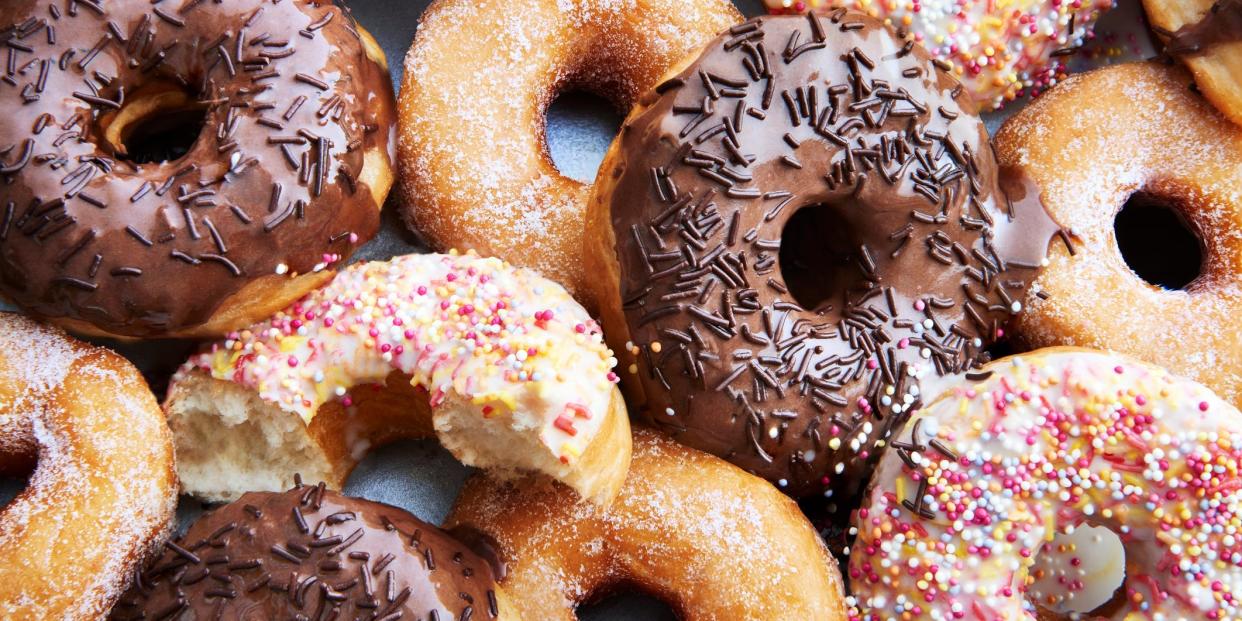Not all processed foods are unhealthy - here's what to avoid and how to find healthy alternatives

Minimally processed foods, like baby carrots or honey, are still healthy for you.
Ultra-processed foods like cookies or hot dogs increase your risk of obesity and heart disease.
To avoid processed foods, eat more fruits and vegetables, buy local, and avoid added sugars.
Processed foods are often high in calories, carbohydrates, and sugar, but have minimal nutrition. And while eating some processed food isn't the worst thing you can do, the problem is that most of us eat more than just some.
In fact, an estimated 60% of people in the US eat a diet consisting largely of highly-processed foods. And that does not bode well for American's waistlines and overall health.
We spoke to dietitians about what makes a food "processed", whether you should avoid them entirely, and how to incorporate healthy alternatives into your diet.
What is processed food?
Processed foods are foods that have undergone changes from their natural state. They are often not considered as healthy as their non-processed counterparts because they tend to contain added salts, sugars, or fats for flavor or to extend shelf life.
"Almost every food we consume is processed to some degree," says Scott Keatley, a registered dietitian-nutritionist at Keatley MNT. However, the more processed a food is, the more unhealthy it will be.
There are three different categories of processed foods, says Illa Jones, RDN, a dietitian and founder of The Millennial Nutritionist:
Minimally processed, which are pre-prepped, but you should still be able to tell what the natural state of the food is just by looking at it. Examples include:
Fruit cups
Baby carrots
Boneless-meats
Dried berries
Mid-level processed, which has added ingredients to enhance a food's texture or flavor. These include:
Bread
Granola
Hummus
Cheese
Highly processed, which is when a food is completely altered from the whole food version by adding or removing certain nutrients and ingredients. These include:
Twinkies
Hot dogs
Protein powder
Packaged cookies
Minimally processed foods are usually healthy because the naturally-occurring vitamins and nutrients tend to stay in the foods, even after being processed.
Instead, watch out for highly processed products, says Keatley. These tend to be less filling and nutritious, and more calorie-dense, which could cause weight gain or obesity.
What the research says: A small 2019 study compared the eating habits of participants on an ultra-processed diet and a minimally processed diet for 14 days. The study found those who ate ultra-processed foods ate more and gained more weight compared to those who ate minimally processed foods.
How to avoid processed food
Not all processed foods are unhealthy, and some may even benefit your health like honey or whole grain bread. However, some people may want to limit processed foods to reduce their sugar, salt, caloric, or fat intake.
Here are some tips to help you avoid ultra-processed foods.
Avoid certain ingredients and nutrients: A few ingredients you may want to avoid if you are aiming to minimize highly-processed foods include sodium and trans-fat. You may also want to stick to foods that have short ingredient lists. Oftentimes, the more processed food is, the longer the ingredients list.
Avoid fast food: Most fast food is ultra-processed, low in nutrients, and high in sodium and calories. Eating too much fast food can also put you at risk for certain health conditions like heart disease, hypertension, or obesity.
Avoid pre-packaged items: Pre-packaged foods lack fiber and contain added salt, sugar, or fat, says Keatley. "This extends the shelf life of these [products] and can make them more satisfying, but really cuts out some important nutrients," he says.
Avoid added sugars: Added sugars are those added during processing, like corn syrup, corn sugar, sucrose, or glucose. They are different from naturally occurring sugars found in fruits and dairy products which are less likely to cause blood sugar spikes.
Healthy alternatives to highly processed food
Buy local: When you buy from farmers' markets, the food is fresher and there are fewer people involved in food handling, making it less processed. Locally grown foods also are more nutrient-dense.
Shop the perimeter of the store: Many foods found in the center aisles have added preservatives that help them stay "fresh." Fresh foods, like dairy, fruits, and vegetables are found around the perimeter of grocery stores.
Swap refined grains for whole grains: Whole grains are considered "whole" because they retain the bran, germ, and endosperm of the grain seed. These parts of the grain seed are high in antioxidants, B vitamins, and protein. Refined grains are stripped of these three parts of the seed, making them less nutritious.
Buy more fruits and vegetables: Swap ultra-processed foods for fresh fruits and vegetables. Fruits and vegetables are healthy snack options because they tend to be low in calories, high in nutrients, and contain no preservatives or added sugars.
Insider's takeaway
Highly processed foods tend to be high in sugars, salt, and fats. However, not all processed foods are bad for you, rather, it's just those considered ultra-processed like sugary sodas or instant dinners.
Some ways to limit your processed food intake is to avoid packaged foods with long ingredient lists and opt for fresh foods like fruits, vegetables, or dairy products. Jones suggests seeking the help of a registered dietitian if you are concerned about your diet.
Is peanut butter good for you? How it can help you lose weight, manage blood sugar levels, and boost your protein intake4 science-backed benefits of honey and which type is healthiest for youThe FDA made it easier to spot sneaky added sugar in your food - here's how to avoid it, says nutritionists6 easy ways to start eating healthy, according to dietitians
Read the original article on Insider

